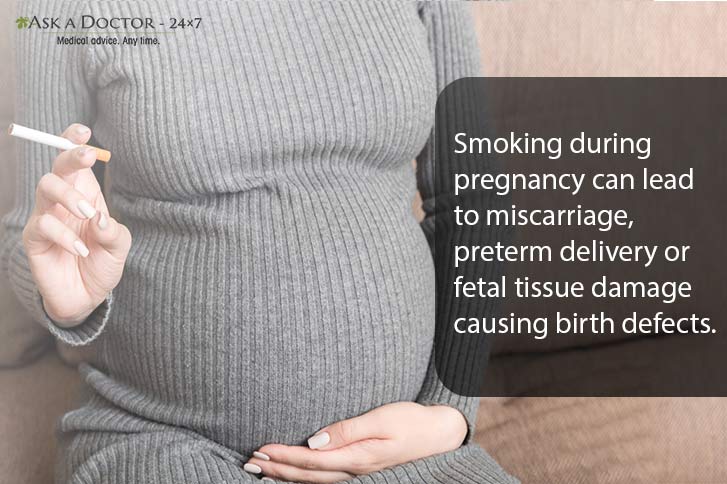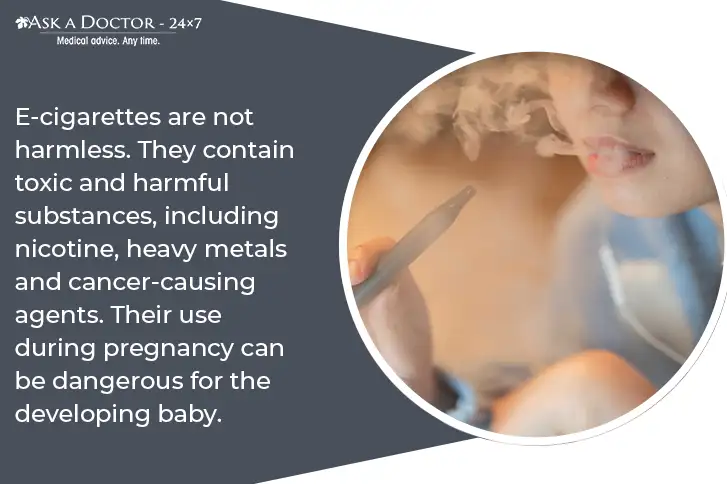Smoking In Pregnancy Raises Risk Of Birth Defects: What, Why, And How?
Smoking during pregnancy can have detrimental effects on the fetus that may not only result in developmental complications but can also have life-long consequences for your baby. Tobacco smoke contains more than 7,000 toxic chemicals. Nicotine and other harmful substances such as carbon monoxide present in tobacco smoke can cross the placenta and enter fetal circulation. These may then interfere with the neonateŌĆÖs blood supply and cause tissue injury.
Our expert unravels a few 'must-know' facts related to the consequences of smoking during pregnancy and also shares some doable tips to help moms-to-be quit smoking and tobacco use. Read on...
Health Effects of Smoking on Babies

Smoking during pregnancy can increase the risk of delivery complications and birth defects. These include:
- Abnormal bleeding during pregnancy and delivery
- Stillbirth (birth of a dead baby)
- Preterm delivery
- Low birth weight
- Sudden infant death syndrome (SIDS)
- Birth defect of the mouth and lip (orofacial cleft)
- Lung infections such as pneumonia
- Impaired lung function and breathing problems such as wheezing, asthma, and bronchitis
- Smaller brain size and changes in brain function
- Brain damage that affects movement and muscle tone (cerebral palsy)
- Heart defects
- Vision or hearing problems
- Developmental delays
- Hypertension during childhood
- Increased incidence of obesity and metabolic disorders in later life
Effect of Second-hand and Third-hand Smoke on Babies
Second-hand smoke is the smoke you inhale when being around someone who is smoking. Second-hand smoke has approximately 4000 chemicals. Exposing yourself to second-hand smoke when you are pregnant can increase the risk of:
- Miscarriage
- Early birth
- Low birth weight
- Learning and behavioral deficit
- SIDS
Third-hand smoke is the inhalation of the chemical-laden smoke residue that sticks to the walls, furniture, carpet, clothes, skin, or hair. The residue may remain on these surfaces for months or even years. A study conducted at the Los Angeles Research Institute found that third-hand smoke residue has a damaging effect on the lung development of the fetus and may result in respiratory problems in later life.
Are E-cigarettes Safe During Pregnancy?

Electronic cigarettes (e-cigarettes) contain flavored liquid that has nicotine and other chemicals including cancer-causing compounds and heavy metals such as lead, tin, and nickel. They run on batteries and are used by puffing on the mouthpiece and inhaling the vapors or mist of the heated liquid. They may look like regular cigarettes, pens, asthma inhalers, or USB sticks.
Although e-cigarettes are less harmful than regular cigarettes and contain fewer toxic chemicals than regular cigarettes, they are not free from nicotine and other harmful compounds. Therefore, e-cigarettes are injurious for pregnant women and toxic to their developing babies.
How Quitting Smoking May Help Your Baby
.jpg)
Smoking is one of the major modifiable risk factors associated with poor pregnancy outcomes. It is true that the less you smoke the better, but when it comes to your baby, itŌĆÖs best to stop smoking altogether. Ideally, you should quit smoking before getting pregnant. Quitting as early as possible in pregnancy can have positive outcomes on your babyŌĆÖs health.
On the other hand, cutting down on the number of cigarettes smoked during pregnancy has not been found to be associated with improvement in post-delivery outcomes on the babyŌĆÖs health status. Thus, it is recommended to aim for smoking discontinuation, rather than a reduction in the number of cigarettes smoked.
During pregnancy, smoking and exposure to second-hand smoke are the major preventable causes of low birth weight and preterm birth. According to the World Health Organization (WHO), preterm birth is a leading cause of newborn morbidity and mortality.
Studies have shown that quitting smoking even in the third trimester can have up to 19% risk reduction of low birth weight and 19% risk reduction of preterm birth. If expecting mothers stop smoking before the end of the first trimester, the birth weight is similar to that of infants of non-smoking mothers.
Here are a few tips a woman can follow to quit smoking:
Prepare a list of reasons why you want to quit and have a look at it whenever you crave smoking. Quitting smoking is a challenge for any person. When you are pregnant remember that every time you say ŌĆśnoŌĆÖ to smoking, you are allowing your baby to get more oxygen and helping him to breathe easily. This can make you feel better and keep you motivated towards your goal of quitting. Last but not least, make sure to get rid of objects that remind you of smoking such as cigarette lighter, ashtray, and any leftover cigarettes.
Find out what triggers you to smoke. Stress, anxiety, social events, and certain activities can be your triggers. Once you know your triggers you may work towards handling them so that you can manage your urge to smoke. A quick walk, some deep breathing, snacking on healthy food, chewing gum, or watching a funny video are some ways that can divert your mind away from smoking.
Stress is one of the major triggers for smoking. To overcome stress, you may try meditation, breathing exercises, light yoga, walking, and listening to soothing music or chants.
Experiencing a myriad of emotions due to hormonal changes in pregnancy is normal and your efforts to quit can add to your woes. Therefore, do not hesitate to take help from your family and friends. You may even consult a counselor or seek a Gynecologist consultation online.
By quitting smoking you may reduce the risk of complications during pregnancy and may provide your baby a chance to lead a healthy life in the future.
Recently Answered Questions Related to Pregnancy
Ask a Specialist
Recent Questions


